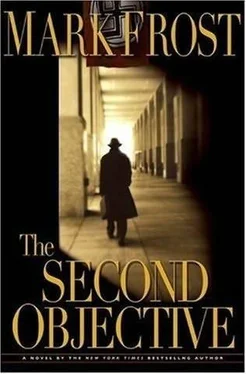The meeting was interrupted by the arrival of a brigadier general, deputy to Eisenhower’s chief intelligence officer, British Brigadier General Kenneth Strong. The man appeared grim and called Strong out of the room. Eisenhower saw the same look on Strong’s face when he returned, and asked him to share what he’d learned. Strong moved to one of the large maps that adorned the walls.
“We’re getting fragmented reports that the enemy counter attacked this morning across a broad front,” said Strong. “Here, in the Ardennes, First Army sector, all the way down into Luxembourg.”
Eisenhower looked to Bradley, whose headquarters were in Luxembourg City. “What do you know about this?”
“I was in Spa with General Hodges yesterday, but I didn’t see any of this myself,” said Bradley.
“Didn’t you hear anything, Brad?”
“Some early reports came in as we were leaving. My first thought was it’s just a spoiling attack. That’s what I still think. They’re trying to disrupt our move across the Rhine.”
Eisenhower stood up to join them at the map and pointed at the Losheim Gap. They called this sector the “Ghost Front,” for it had seen no heavy action since Hitler’s panzer blitz to Paris four years earlier. Eisenhower also knew that this same sleepy seven-mile corridor had served as the fast lane for Germany’s first-strike invasions of France in 1914 and 1870. Concentrating their effective forces to the north and south after pushing the Germans out of France, the Allies had rolled the dice that in winter the harsh terrain and broken roads of the thinly held Ardennes offered no strategic advantage or tactical temptation to the reeling Nazi army.
“We’re spread pretty thin in here, aren’t we, Brad?”
“Four divisions.”
“Fairly green, aren’t they?”
“Two of them are replacements. The others we’ve pulled off the line after heavy action.”
“So it’s half nursery, half old folks’ home.”
“That’s the risk we’ve taken.”
“How many divisions have they committed; do we have a count?”
“Not yet,” said Strong. “But Jerry’s put together a steady buildup on the other side of the Siegfried, as many as ten divisions already-”
“And intelligence always indicated that was purely defensive, in anticipation of our moving against them,” said Bradley, slightly irritated.
“Well, it isn’t defensive now.”
“This has to be a local attack, to distract us from Patton’s move into the Rhine.”
They had all been stunned by the news, but Eisenhower was the first to recover. His headache was gone, swept away by alarm and clarity. “This is our weakest point. Why would they hit our weakest point in force?”
“I don’t know the answer,” admitted Bradley. “He’s not after a terrain objective. That ground doesn’t mean anything.”
“This is no spoiling attack. Not with those kind of numbers.”
“Then what kind of attack is it?” asked Bradley.
“I don’t know yet, Brad, but we’re not going to wait to find out. First Army doesn’t have any reserve; they’ve caught us with our pants down.”
“I’m sure Hodges would’ve let us know by now-”
“Maybe he can’t. Mobilize 7th Armored out of Holland, get them moving toward Spa by morning. And I want three more divisions on stand-by to support this sector until we get it sorted out,” said Eisenhower. “What’s available to us?”
“We’ve got the 82nd and 101st bivouacked near Reims,” said Strong.
“They’re still being refitted,” said Bradley.
“Cancel all leaves, get ’em back in camp and ready to move in twenty-four hours,” said Eisenhower. “Patton’ll have to give us one of his for the third.”
“That’s going to hurt his move across the Saar,” said Bradley. “George isn’t going to like it.”
“George isn’t running this damn war,” said Eisenhower.
They wouldn’t learn until the following day that General Courtney Hodges, commander of First Army, headquartered in Spa, had been trying since early morning to alert Allied headquarters in Versailles that German forces were rolling over his forward positions.
His phone lines had all been cut.
The foul weather hovering over the Ardennes worsened during the night. Cold winds pushed through a front with heavy cloud cover that discharged sleet storms and sporadic snow. Across the Channel, all of England remained socked in as well, grounding Allied fighters and bombers that might have blunted the initial German advance. C-47 transports were unable to take off from British bases, denying reinforcements and fresh supplies to the troops under siege throughout the expanding front.
By dawn the disjointed communications received by Supreme Allied Command had coalesced into an alarming realization that the weakest sector in their front line was under assault from thirty-six divisions, over half a million men, the largest German offensive of the entire war.
The Ardennes
DECEMBER 16, 10:00 P.M.
Bernie powered the jeep along a logging road into the cover of a nearby forest. Hearing more German troops headed their way, he pulled off the road and the six young soldiers of the 99th Infantry covered the jeep with evergreen branches downed by an artillery barrage. Bernie, Von Leinsdorf, and the Americans waited in silence as the forward line of German infantry and scout cars swept past them, visible twenty yards away on the edge of the woods. Von Leinsdorf had to order the agitated engineers to stay down and keep silent. Those were battle-ready German veterans; if these green kids drew fire, they were all dead. Once the Germans passed-Von Leinsdorf identified them as a reconnaissance company-they climbed back on the jeep and cautiously drove deeper into the woods to the east.
An hour after dark they came across an abandoned woodcutter’s cabin. Bernie parked the jeep in a small shed out back and shut the doors. Inside, they pulled the curtains to black out the one-room cabin, lit a kerosene lamp, and settled in for the night. Bernie helped tend the injured GIs with the jeep’s med kit. The crump of artillery, rockets flying overhead, and the crackle of small arms continued through the night. The riflemen shared their K rations, eaten cold. Von Leinsdorf learned as much as he could from the Americans about their company and its movements during the last day. It was clear the German attack had taken the Allies completely by surprise.
Von Leinsdorf assigned a sentry rotation for the platoon, to get them through what remained of the night. The first man stood his post at the door while the rest bunked down around the room. Von Leinsdorf asked the platoon sergeant for a look at their maps, which he spread out on the room’s crude table. Von Leinsdorf held the lamp close and tried to pinpoint their position.
One of the American kids, a baby-faced private, crawled over next to Bernie and offered him a smoke, then lit it for him, cupping his hand to hide the flame.
“You’re from New York, ain’tcha?” the kid asked.
“Yeah.”
“Thought so. Heard it in your voice. Me too. Charlie Decker.”
“Jimmy Tenella,” said Bernie.
“Pleased to meetcha, Jimmy. I’m from the Bronx, Grand Concourse up near Van Cortlandt Park?”
“Yankees fan?”
“Only since birth.”
“I’m from Brooklyn.”
“Dem bums. Too bad for you.” They shook hands awkwardly. “So how long you been over here, Jimmy?”
“Too long,” said Bernie. He noticed Von Leinsdorf watching them from across the room.
“You in the first wave? Since D-day, huh?”
“Feels like longer.”
“Wow. We been here three weeks. Fresh off the banana boat,” said Charlie, trying to sound hardened and indifferent. “I graduated high school six months ago. I never been anywhere before.”
Читать дальше












